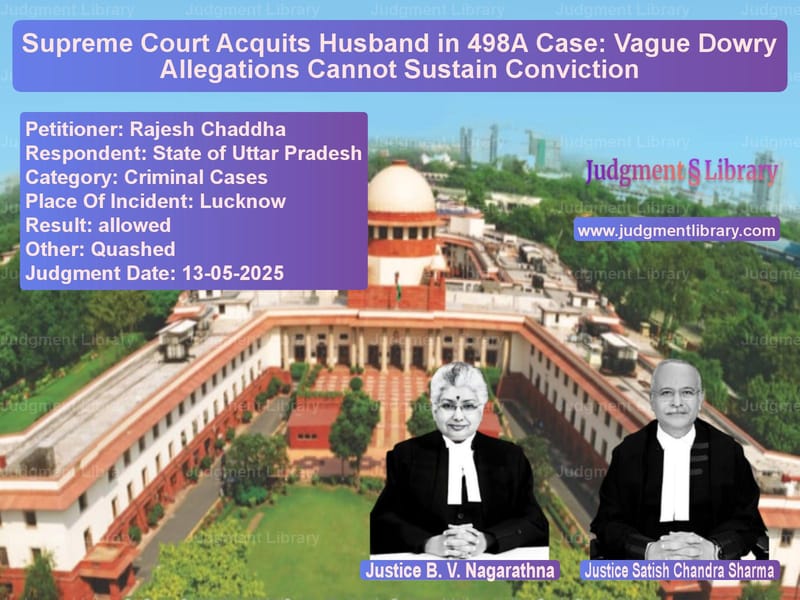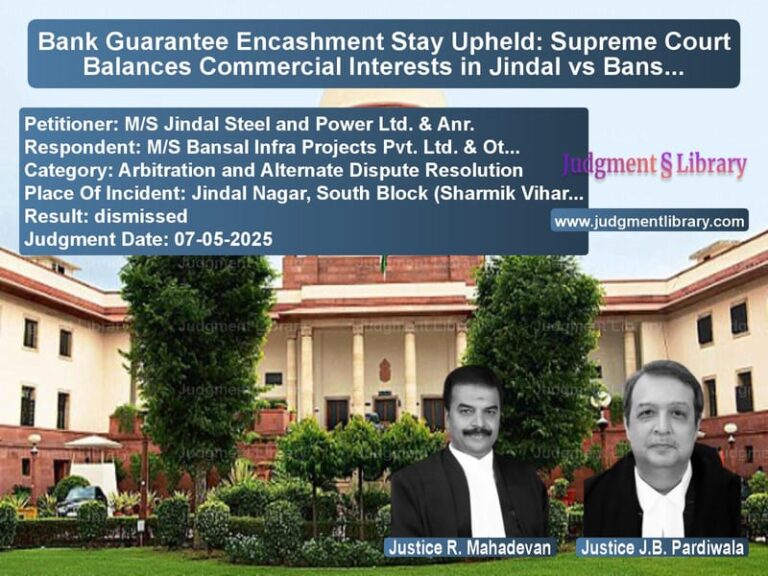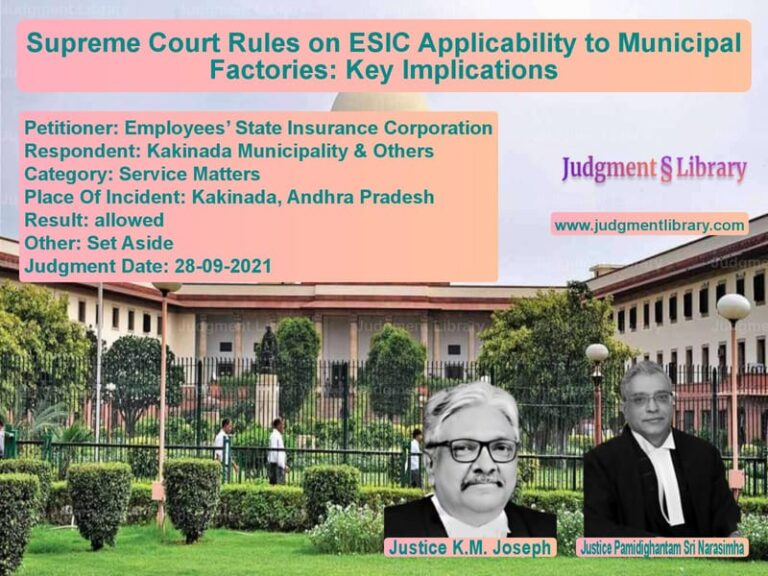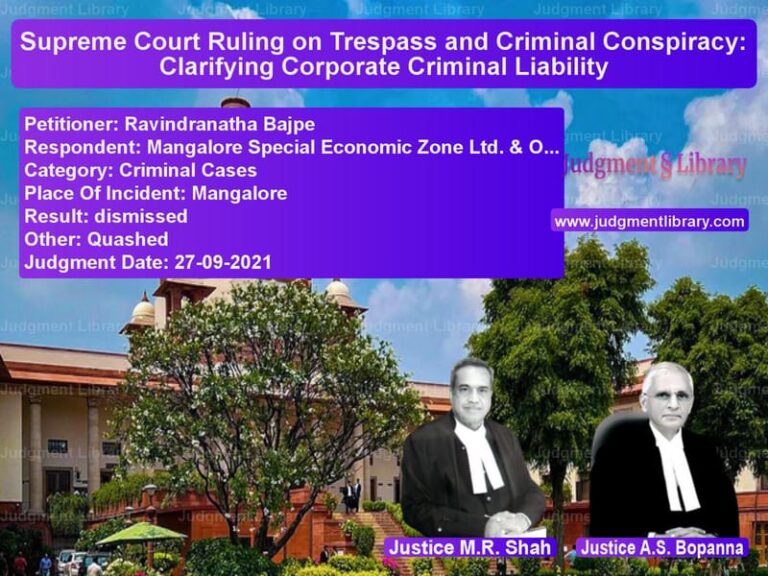Supreme Court Acquits Husband in 498A Case: Vague Dowry Allegations Cannot Sustain Conviction
In a landmark judgment delivered on May 13, 2025, the Supreme Court of India acquitted a husband who had been fighting criminal charges for over two decades in a dowry harassment case. The Court’s ruling in Rajesh Chaddha versus State of Uttar Pradesh brings crucial clarity to the application of Section 498A of the Indian Penal Code and the Dowry Prohibition Act, emphasizing that vague allegations without specific details and corroborative evidence cannot form the basis for criminal conviction.
The case originated from a marriage between Rajesh Chaddha and Mala Chaddha that took place on February 12, 1997. According to the complainant wife, the couple lived together for only about a year, during which she alleged suffering severe mental and physical torture for not bringing sufficient dowry. The prosecution’s case claimed that the appellant and his family members were constantly dissatisfied with the dowry and subjected her to continuous harassment, taunts, and physical abuse.
Among the serious allegations were claims that the appellant and his family forced her to consume milk mixed with narcotic substances, made her attend parties where alcohol was served against her wishes, and physically assaulted her on multiple occasions. The most grave accusation was that she was pushed out of the house while pregnant, resulting in a miscarriage. The FIR was eventually registered on December 20, 1999, under Sections 498A, 323, 506 of the IPC and Sections 3 and 4 of the Dowry Prohibition Act.
The legal journey through the courts saw mixed outcomes. The Trial Court acquitted the appellant for offences under Section 323 (voluntarily causing hurt) read with Section 34 (common intention) and Section 506 (criminal intimidation) of the IPC but convicted him under Section 498A IPC and Section 4 of the Dowry Prohibition Act. The Appellate Court and the High Court subsequently upheld this conviction, leading to the final appeal before the Supreme Court.
Before the Supreme Court, the appellant’s counsel presented several compelling arguments. They contended that “the allegations under Section 498A IPC and Section 4 of the D.P. Act, 1961, were unsustainable qua the Appellant, as there is no independent evidence on behalf of the prosecution, and the entire case hinges upon the deposition of the father of the Complainant and Complainant herself.” The counsel further argued that “the Complainant who cohabited with the Appellant only for a period of about a year, had made bald allegations without any specifics of date, time or event, in the FIR in Case Crime No. 60/1999, which has only been registered as a counter-blast to the Divorce Petition preferred by the Appellant.”
An important procedural point raised was that “the High Court passed the Impugned Order in absence of representation of a Counsel on behalf of the Appellant, which is not permissible. Learned Counsel for the Appellant submitted that in the absence of a Counsel for the Appellant, the High Court could have appointed an amicus-curiae to represent the case of the Appellant, rather than passing an adversarial order against him.”
The State, representing the prosecution, countered these arguments by maintaining that “to establish cruelty within the threshold of Section 498A, the evidence of the relatives of the Complainant wife cannot be brushed aside. The deposition of the father of the Complainant does establish that the Complainant was time and again harassed, and beaten her up for not bringing enough dowry.”
The Supreme Court, in its analysis, began by examining the statutory provisions governing the case. The Court noted that Section 498A defines cruelty as “any wilful conduct which is of such a nature as is likely to drive the woman to commit suicide or to cause grave injury or danger to life, limb or health (whether mental or physical) of the woman; or harassment of the woman where such harassment is with a view to coercing her or any person related to her to meet any unlawful demand for any property or valuable security or is on account of failure by her or any person related to her to meet such demand.”
The Court made a significant observation about the nature of the allegations, stating: “In the present case, the allegations made by the Complainant are vague, omnibus and bereft of any material particulars to substantiate this threshold. Apart from claiming that Appellant husband harassed her for want of dowry, the Complainant has not given any specific details or described any particular instance of harassment.”
The judgment highlighted the absence of crucial evidence, noting that “the allegations in the FIR, and the depositions of the prosecution witnesses suggest that on multiple occasions, the Complainant wife was ousted from the matrimonial house, and kicked and punched in the presence of her father, PW-2 herein and she was repeatedly tormented with dowry demands, and when she was unable to honor them, the Appellant and her family physically beat her up; whereas she has not mentioned the time, date, place, or manner in which the alleged harassment occurred.”
Regarding the serious allegation of miscarriage, the Court pointed out that “It is alleged that the Complainant suffered a miscarriage, as she fell down, when the Appellant and her family who pushed her out of the house; however, no medical document from any medical institution or hospital or nursery was produced to substantiate the allegations.”
The Supreme Court expressed deep concern about the growing misuse of anti-dowry laws, observing: “Notwithstanding the merits of the case, we are distressed with the manner, the offences under Section 498A IPC, and Sections 3 & 4 of the D.P. Act, 1961 are being maliciously roped in by Complainant wives, insofar as aged parents, distant relatives, married sisters living separately, are arrayed as accused, in matrimonial matters. This growing tendency to append every relative of the husband, casts serious doubt on the veracity of the allegations made by the Complainant wife or her family members, and vitiates the very objective of a protective legislation.”
The Court reinforced this concern by quoting from its earlier judgment in Dara Lakshmi Narayana & Ors. v. State of Telangana & Anr.: “A mere reference to the names of family members in a criminal case arising out of a matrimonial dispute, without specific allegations indicating their active involvement should be nipped in the bud. It is a well-recognised fact, borne out of judicial experience, that there is often a tendency to implicate all the members of the husband’s family when domestic disputes arise out of a matrimonial discord. Such generalised and sweeping accusations unsupported by concrete evidence or particularised allegations cannot form the basis for criminal prosecution. Courts must exercise caution in such cases to prevent misuse of legal provisions and the legal process and avoid unnecessary harassment of innocent family members.”
The judgment made a crucial distinction between emotional distress and criminal culpability, noting: “Although one cannot deny the emotional or mental torture that the Complainant may have undergone in the marriage, however a cursory or plausible view cannot be conclusive proof to determine the guilt of an individual under Section 498A & Section 4 of the D.P. Act, 1961, especially to obviate malicious criminal prosecution of family members in matrimonial disputes.”
The Court also took judicial notice of the timing of the FIR, observing that “the FIR dt. 20.12.1999 was registered after the Appellant had filed the Divorce Petition under Section 13 of Hindu Marriage Act, 1955 on 06.02.1999. In consideration thereof and that the Complainant had cohabited with the Appellant only for a period of about a year, it appears that the FIR registered by the Complainant was not genuine.”
In its concluding remarks, the Supreme Court delivered a powerful message about the importance of specificity in criminal complaints: “The term ‘cruelty’ is subject to rather cruel misuse by the parties, and cannot be established simpliciter without specific instances, to say the least. The tendency of roping these sections, without mentioning any specific dates, time or incident, weakens the case of the prosecutions, and casts serious suspicion on the viability of the version of a Complainant. We cannot ignore the missing specifics in a criminal complaint, which is the premise of invoking criminal machinery of the State.”
The Court allowed the appeals, set aside the High Court’s order, and acquitted the appellant of all charges. This judgment serves as an important precedent that balances the need to protect genuine victims of dowry harassment while preventing the misuse of protective laws that could lead to the harassment of innocent individuals through false and vague allegations.
The ruling emphasizes that criminal law requires specific, verifiable allegations supported by evidence, and that matrimonial disputes, however emotionally charged, must meet the same standards of proof as other criminal cases. The decision is likely to have far-reaching implications for how courts approach cases under Section 498A IPC and the Dowry Prohibition Act, ensuring that these laws serve their intended protective purpose rather than becoming tools for vendetta in failed marriages.
Petitioner Name: Rajesh Chaddha.Respondent Name: State of Uttar Pradesh.Judgment By: Justice B. V. Nagarathna, Justice Satish Chandra Sharma.Place Of Incident: Lucknow.Judgment Date: 13-05-2025.Result: allowed.
Don’t miss out on the full details! Download the complete judgment in PDF format below and gain valuable insights instantly!
Download Judgment: rajesh-chaddha-vs-state-of-uttar-prade-supreme-court-of-india-judgment-dated-13-05-2025.pdf
Directly Download Judgment: Directly download this Judgment
See all petitions in Dowry Cases
See all petitions in Domestic Violence
See all petitions in Fraud and Forgery
See all petitions in Legal Malpractice
See all petitions in Judgment by B.V. Nagarathna
See all petitions in Judgment by Satish Chandra Sharma
See all petitions in allowed
See all petitions in Quashed
See all petitions in supreme court of India judgments May 2025
See all petitions in 2025 judgments
See all posts in Criminal Cases Category
See all allowed petitions in Criminal Cases Category
See all Dismissed petitions in Criminal Cases Category
See all partially allowed petitions in Criminal Cases Category







